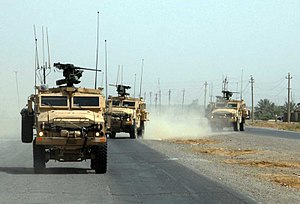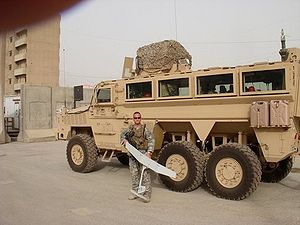RG-33
| RG-33 (standard four wheel variant) | |
|---|---|
 |
|
| Type | Infantry Mobility Vehicle |
| Place of origin | South Africa |
| Service history | |
| In service | 2007 – present |
| Used by |
United States Army United States Marine Corps Croatian Army |
| Wars | Global War on Terrorism |
| Production history | |
| Designer | Land Systems OMC |
| Manufacturer | BAE Systems Land Systems South Africa |
| Unit cost | $300,000 |
| Variants | RG-33 (4x4) |
| Specifications | |
| Length | 22.1 feet (6,700 mm) |
| Width | 8 feet (2,400 mm) |
| Height | 9.5 feet (2,900 mm) |
| Crew | 4 + 2 crew |
|
|
|
| Armor | monocoque v-hull |
|
Main
armament |
Optional armored glass turret or remote weapon station |
| Engine | Cummins 400 I6 Diesel 400hp |
| Transmission | Allison 3200 |
| Suspension | 4x4 Double wishbone suspension |
| Ground clearance | 14 inches (360 mm) |
| Speed | 68 miles per hour (109 km/h) |
| RG-33L (six wheel extended variant) | |
|---|---|
 |
|
| Service history | |
| Used by |
US Army US Marines Croatian Army |
| Wars | Global War on Terrorism |
| Production history | |
| Designer | Land Systems OMC |
| Manufacturer | BAE Systems Land Systems South Africa |
| Unit cost | $630,000 |
| Produced | October 2006 (RG-33L) |
| Variants | RG-33L (6x6) |
| Specifications | |
| Length | 28 feet (8,500 mm) |
| Width | 8 feet (2,400 mm) |
| Height | 9.5 feet (2,900 mm) |
| Crew | 8 + 2 crew |
|
|
|
| Armor | monocoque v-hull |
|
Main
armament |
Optional armored glass turret or remote weapon station |
| Engine | Cummins 400 Turbo Diesel 400hp |
| Transmission | Allison 3200 |
| Suspension | 6x6 Double wishbone suspension |
| Ground clearance | 14 inches (360 mm) |
| Fuel capacity | 80 gal |
| Speed | 67 miles per hour (108 km/h) |
The RG-33 is a mine-resistant light armored vehicle initially designed by BAE Systems Land Systems South Africa (formerly Land Systems OMC) a South African subsidiary of BAE Systems. BAE Systems in the US extensively modified it with additional protection, new power train and suspension systems. It was built in a number of locations including York, Pennsylvania, USA. It was one of several vehicles being fielded by the US Armed Forces in Iraq under the MRAP program.
It is based on the RG-31, which itself is based on the Mamba APC, although it is roughly twice the weight of a RG-31. There are two variants, the standard RG-33 has four wheels and weighs 22 tons while the extended RG-33L variant has six wheels, can carry twice as many people in the back, and weighs 26 to 37 tons depending on the version.
It was selected to be the sole producer of the US Army's $2.88 billion Medium Mine Protected Vehicle program. The initial contract is worth $20 million. BAE representative Doug Coffey says that live-fire testing at Aberdeen, Maryland, proved the RG-33 to be the overall most survivable MRAP vehicle.
The RG33 is manufactured in several configurations including the category I 4×4, category II 6×6, the heavy armored ground ambulance (HAGA) and the special operations command (SOCOM) vehicle.
It features a monocoque armored v-hull, for maximized interior space, seats and footrests suspended from the ceiling, run-flat tires, and an optional armored glass turret (Gunner Protection Kit or GPK), for maximized visibility and protection. The monocoque hull does not extend under the engine like some other armored vehicles. The engine compartment is a separate moncoque structure that bolts to rest of the hull. The vehicle is notable for its extensive use of TRAPP armored glass in the crew compartment. Like the Buffalo, it can be equipped with a robotic arm.
...
Wikipedia
